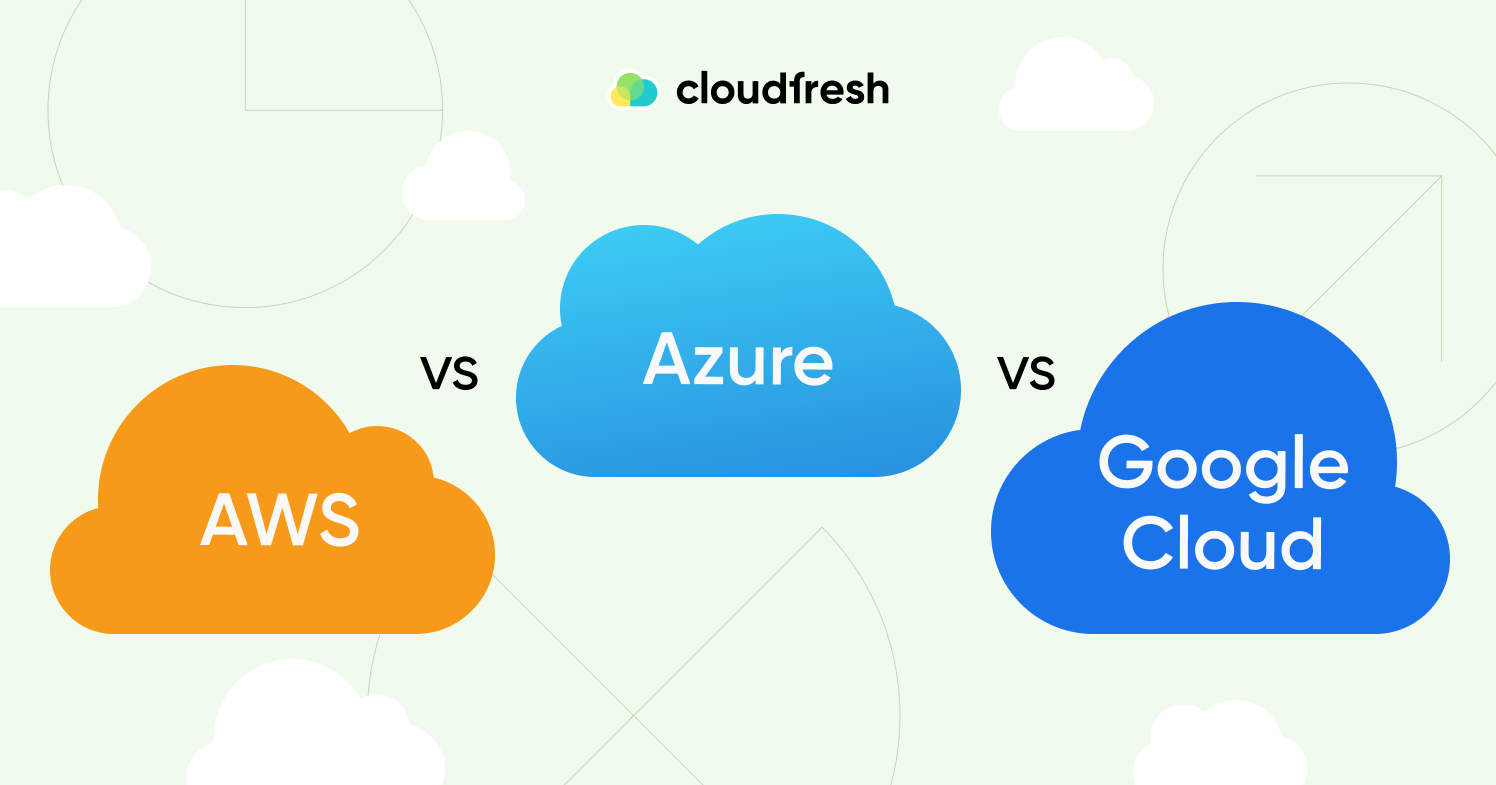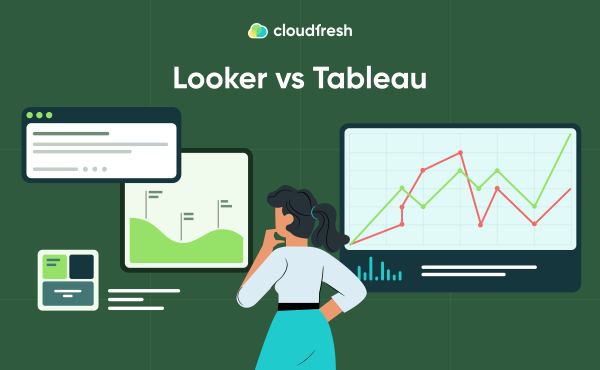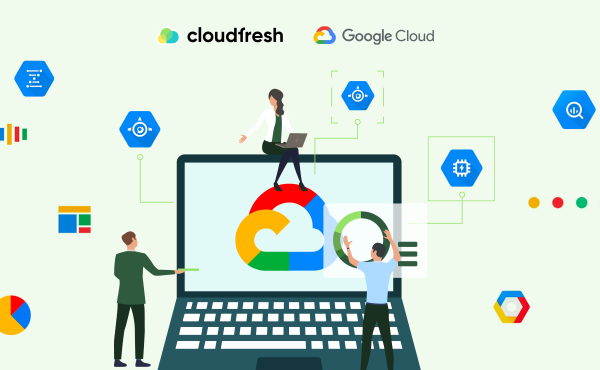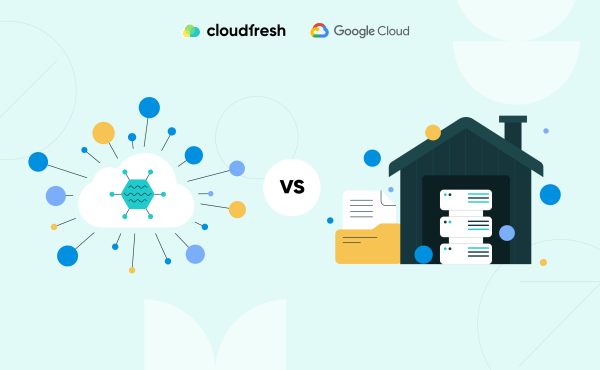Looker vs Tableau: How to Choose the Best BI Tool for Your Business
AWS vs Azure vs Google Cloud
- Understanding the top cloud providers
- AWS vs Microsoft Azure vs Google Cloud: Key Differences

- More key points to consider
- Summing up

Any professional craftsman will tell you that the quality of the work performed directly depends on the quality of the tools. In the case of cloud masters, the situation is the same. When choosing Amazon Web Services vs Azure vs Google Cloud products, you can compare them all using the same criteria and choose the right tool for your business.
In this blog, we’ll delve into a comprehensive comparison of cloud providers to aid your decision-making between Microsoft Azure vs AWS vs Google products.
In the ever-evolving landscape of cloud computing, not all clouds are equally beneficial. There are three distinct generations of the cloud – Virtual Data Centers, the Infrastructure-as-a-Service (IaaS) Generation, and the cutting-edge 3rd Generation cloud. Focusing on the latter, we explore its modern significance and, therefore, the almost equal benefits as parts of one generation that stands for what we know as a modern cloud.
Let’s navigate the distinctions and the similarities among the top three cloud providers. But before we embark on this comparison, let’s explore what the three providers represent for modern businesses.
Understanding the top cloud providers
Before we plunge into the comparison of AWS, Google Cloud, and Azure, let’s briefly examine what these three cloud giants offer to today’s businesses.
What is AWS (Amazon Web Services)
Amazon Web Services (AWS) is a comprehensive cloud computing platform provided by Amazon. It offers a vast array of services, including computing power, storage solutions, and databases, empowering businesses to scale and innovate without the need for substantial upfront investments. Trusted by millions, AWS is known for its reliability, flexibility, and extensive global infrastructure. AWS boasts a vast portfolio of over 200 cloud services, offering an expansive range from compute and edge computing to serverless solutions. Key offerings include Amazon EC2 for computing, Amazon S3 for elastic object storage, Amazon EBS for networking, and Amazon Lambda for serverless computing.
AWS is an exceptional choice for those seeking a public cloud provider excelling in Infrastructure-as-a-Service (IaaS) with pay-as-you-go pricing and autoscaling resources. With IaaS, AWS simplifies the cloud experience, providing servers, networking, computing, and storage resources without the hassle of procuring or managing infrastructure. It’s the epitome of cloud flexibility and efficiency.
What is Microsoft Azure
Microsoft Azure is a cloud computing platform that provides a wide range of services to help organizations build, manage, and deploy applications globally. With an emphasis on seamless integration with Microsoft’s ecosystem, Azure offers robust computing, analytics, networking, and more solutions. It’s a trusted choice for enterprises, offering a hybrid approach and strong support for diverse workloads.
A couple of standout features underline Azure’s popularity among enterprises. Firstly, the ease of transition is amplified for many enterprises already utilizing Microsoft products like Microsoft 365, SQL Server, SharePoint, and Power BI. Integrating Microsoft’s cloud services becomes a logical and efficient extension of their existing technology stack.
Moreover, Azure’s commitment to a hybrid cloud approach resonates well with modern enterprises. Integrating on-premises and public cloud services addresses the growing trend where companies desire to maintain their data centers while harnessing the benefits of the cloud. In this context, Azure emerges as a strategic ally, facilitating a seamless blend of on-premises infrastructure with the agility and innovation the cloud offers (see on premise vs cloud as well).
What is Google Cloud
Google Cloud is a suite of cloud computing services from Google designed to assist businesses in leveraging the power of data and innovation. With a focus on data analytics, machine learning, and open-source technologies, Google Cloud Platform (further, GCP) offers a flexible and scalable infrastructure. It’s a preferred choice for organizations seeking cutting-edge solutions and a strong foundation for digital transformation.
Google Cloud is renowned for its cutting-edge security options, setting industry standards for robust data and systems protection, and providing hybrid and multi-cloud solutions, offering unparalleled flexibility for organizations. GCP also provides top-notch data warehouse solutions, allowing organizations to store, manage, and analyze vast amounts of data efficiently. Its innovative Business Intelligence (BI) and Machine Learning (ML) features stand out. Businesses can leverage these tools to derive meaningful insights from their data, drive informed decision-making, and stay at the forefront of technological innovation.
GCP encompasses various services, from Google Workspace and enterprise Android to Chrome OS. While Google Cloud may be the smallest among the Big Three cloud providers, it doesn't fall short in delivering a formidable suite of cloud services. GCP is well-equipped to fuel and bolster a diverse array of applications with its robust offerings.

AWS vs Microsoft Azure vs Google Cloud: Key Differences
Comparing Azure, AWS, and other cloud services involves considering various factors to determine which platform best meets your specific needs. Here’s a comparison based on key points IT and business decision-makers are reviewing while considering migrating to the cloud.
Release, Size & Zones
| Category | AWS | Microsoft Azure | Google Cloud |
| Release | March 2006 | February 1, 2010 | November 2011 |
| Regions | 32 | 47 | 39 |
| Availability Zones | 102 | 92 | 118 |
| Market Share | 22% | 10% | 33% |
While Microsoft Azure boasts the highest number of regions, the true measure of availability lies in the presence of availability zones. In this crucial aspect, Google Cloud is the leader, providing the most zones globally. Each region ensures at least two or three availability zones per region, enhancing cost-effective geographical availability, except for Azure, with only half of the regions having the availability zoned. As we see, Google Cloud’s impressive granularity and youthfulness are complemented by its exceptional availability, solidifying its position as the top choice.
Services. Enterprise adoption. Ecosystem
| Category | AWS | Microsoft Azure | Google Cloud |
| Number | Over 200 | Over 200 | Over 150 |
| Enterprise adoption | High | High | High |
| Ecosystem | Cloud | Cloud+Office 365 | Cloud+Workspace+Maps+Ads+YouTube+Analytics |
| Hybrid | Outpost - HW | AzureStack - HW | GDC - HW+SW, GKE Enterprise - SW |
| Open Source | S3, StackDriver | No | Kubernetes, Istio, and more |
| Multi Cloud | No | No | GKE Enterprise |
Services’ Ecosystem. Even though there are some differences between AWS, Azure, and Google Cloud’s number of services, we should remember that Some GCP services work as part of the “umbrella,” such as the GCP Migration Center. From the ecosystem point of view, Azure and GCP, at the forefront of the ecosystem, showcase LDAP and collaborative apps, slightly outpacing AWS. GCP, pushing the boundaries, integrates Google Maps, Ads, YouTube, and Analytics into its expansive ecosystem, underscoring innovation and comprehensive service offerings.
Hybrid cloud. As we know, many cloud customers want to avoid vendor lock-in; part of this is hybrid and multi-cloud environments. From the Hybrid cloud perspective, all three providers have the hybrid part. But, in cases of using AWS and Azure, you should have the specialized hardware. In Google Cloud, a complete software stack can be installed on your existing hardware or your data centers and use the part of GCP, such as virtual machines, Kubernetes, and others, that would be managed in the Cloud Console.
Open Source. Open source refers to the adoption and support of open-source technologies within cloud computing platforms while signifying that the source code of a software application is freely available for users to view, modify, and distribute. As we see here, while AWS and Google Cloud offer to integrate and interact with various open-source technologies within particular services, Azure is not very open; even implementing some third-party instruments in Microsoft Azure is harder. However, Azure strongly integrates with Microsoft products like Windows Server, Active Directory, and Visual Studio.
Multi-cloud. For the Multi-Cloud support, only Google Cloud, with the help of GKE Enterprise, enables customers to manage several clusters not only in Google Cloud or on-prem but also in other clouds, for example, Azure or AWS.
Computing
| Category | AWS | Microsoft Azure | Google Cloud |
| VMs | Amazon EC2 | Azure Virtual Machines | Google Compute Engine |
| Serverless | AWS Lambda, FarGate | Azure Functions, ACI | Cloud Functions, AppEngine, Cloud Run |
| Container | Amazon ECS, FarGate | ACI | GKE, Cloud Run, GKE Enterprise |
| Spot Instances | Spot Instances | Low Priority VM’s | Spot Instances |
| VMWare | Marketplace | Marketplace | Embedded |
| Custom VM’s | Selected types | Selected types | All GP types |
VMs and Spot Instances. In computing services, each cloud provider presents an extensive array of offerings. While Amazon Lambda pioneered serverless computing, Google Cloud has since evolved with a broader spectrum of options. Notably, spot VMs, a shared feature among all providers, showcase a distinctive advantage in cost-efficiency on GCP, priced at a fraction of what AWS or Azure is.
VMWare. In VMWare integration, Google Cloud has the embedded solution, seamlessly weaving into the platform. In contrast, AWS and Azure offer VMWare solutions through marketplaces, albeit with lower integration. Google Cloud’s approach reflects a commitment to providing a deeply intertwined and comprehensive VMWare solution, distinguishing itself in the cloud services landscape.
Custom VMs. Custom VMs refer to creating virtual machine instances with specific, user-defined configurations for resources like vCPUs (virtual CPUs), memory, and storage. Here, they make the most significant difference while considering the computing options. In Amazon and Azure, they are available but only on some selected types of VMs. On GCP, custom machines are available on all general-purpose kinds of machines, which allows GCP users to tailor the virtual machine specifications according to the specific requirements of their workloads being much more efficient and often saving tens of percents of costs on compute power.
Databases & Analytics
| Category | AWS | Microsoft Azure | Google Cloud |
| Relational | MySQL, Postgres, Maria DB, Oracle, MS SQL | MS SQL, Mongo, Posgres, Maria, MySQL, Cassandra | Cloud SQL, Spanner, Alloy DB |
| Non-SQL | Dynamo DB | Cosmos DB, Azure Table Storage | Big Table |
| In-Memory | ElastiCache for Redis, Memcache | Azure Cache for Redis | Memorystore (Redis, Cluster) |
| Document | Document DB (Mongo) | Cosmos DB | FireBase+Development Env |
| Graph | Neptune | Cosmos DB (Gremlin) | Neo 4j |
| PetaByte Scaling DB | Amazon Dynamo D | Cosmos DB | Spanner, Alloy DB, BigTable |
| Data Warehouse | Redshift | Synapse | BigQuery + ML |
| BI | QuickSight | Power BI | Looker, Looker Studio, Looker Studio Pro |
Petabytes Scaling databases. There are options for the databases on all three platforms. The difference only comes when talking about Petabytes Scaling databases, which are designed and optimized to handle extremely large amounts of data measured in petabytes. While AWS and Azure offer robust options for managing petabyte-scale data with NoSQL databases, Google Cloud offers Spanner and Alloy DB in relational and Bigtable in NoSQL databases.
The choice among these platforms would depend on specific requirements, existing architecture, and preferences for features like global distribution, consistency models, and ease of use. GCP’s Spanner, in particular, is often praised for its global distribution capabilities and transactional consistency at scale.
Analytics. All three cloud giants — GCP, AWS, and Azure — excel in big data, predictive analytics, and AI data lakes. AWS and Azure offer dedicated ML studios; Azure’s studio is exceptionally user-friendly, requiring less technical expertise than Amazon SageMaker.
However, while Reshift and Synapse are great standard data warehouses, GCP stands out with embedded AI and ML capabilities, infusing intelligence into every aspect, from applications to data processing. A great example here would be GСP’s enterprise data warehouse, BigQuery, which also stands for the data lake solutions with Machine Learning embedded, so you can build the machine learning models with SQL without using other programming languages, which is really easy for your data analysts.
BigQuery is:
- Fully managed and serverless for maximum agility and scale
- Real-time insights from streaming data
- Gigabyte- to petabyte-scale storage and SQL queries
- Built-in ML for out-of-the-box predictive insights
- Encrypted, durable, and highly available
- High-speed, in-memory BI Engine for faster reporting and analysis
Cost. Billing. Budget Control
| Category | AWS | Microsoft Azure | Google Cloud |
| Cost Management | AWS Cost Explorer | Azure Cost Management and Billing | Google Cloud Console Billing |
| Billing and Budget Control | AWS Billing and Cost Management Console | Azure Cost Management and Billing Portal | Google Cloud Console Billing |
| Sizing Recommendations | Yes | Yes | Yes |
| Billing Readability | Verylow | Low | High |
AWS, Azure, and GCP are offering a pay-as-you-go structure with reserved instances for cost savings. All three cloud providers provide customers with a comprehensive tool for billing, cost management, and sizing recommendations. In general, all the platforms have pros and can be chosen by your organization depending on your current needs. AWS offers a free tier for new users, and Microsoft Azure Cost Management enables users with tools for optimizing expenses. GCP has a competitive pricing model with sustained use discounts and custom machine types.
More key points to consider
Storage:
When considering storage options, Amazon Web Services (AWS), Microsoft Azure, and Google Cloud Platform (GCP) all offer reliable, scalable, and feature-rich storage solutions, making them more or less equal and readily available for various storage needs. Each cloud provider provides a range of storage services that cater to diverse needs, ensuring that users have ample choices to meet their specific requirements.
Security and Compliance:
AWS: Offers a robust set of security features, compliance certifications, and a shared responsibility model.
Azure: Emphasizes a strong security posture and compliance, especially for industries like healthcare and finance.
GCP: Provides a secure infrastructure with features like Identity and Access Management (IAM) and encryption. GCP is the only Cloud platform that has never been compromised by hacker attacks and recently survived the biggest DDoS attack in history with no consequences on quality of services for customers.
Ease of Use:
AWS: Known for its powerful but sometimes complex interface, AWS offers a variety of SDKs and CLIs for different programming languages.
Azure: Integrates well with Microsoft tools, providing a familiar interface for users of Windows-based systems. Azure Portal is user-friendly.
GCP: Has a straightforward and developer-friendly interface. Offers a web console along with command-line tools.
Support and Documentation:
AWS: Has a large community, extensive documentation, and various support plans. Premium support offers 24/7 access to Cloud Support Engineers.
Azure: Strong support with a range of plans. The documentation is comprehensive, and the platform benefits from Microsoft’s support ecosystem.
GCP: It advertises a variety of support plans, and its documentation is known for being straightforward and well-organized.
Summing up
All three major cloud providers, AWS, Azure, and GCP, offer robust services, making them top contenders in the cloud computing landscape. When choosing between Azure vs Google vs AWS, factors such as region availability, service ecosystem, hybrid cloud capabilities, computing, storage, analytics, and other services play crucial roles. Ultimately, the choice among AWS, Azure, and GCP depends on specific business needs, preferences, and existing technology stacks.
AWS stands out for its extensive service portfolio and widespread adoption, while Azure excels in seamless integration with Microsoft's ecosystem and a hybrid cloud approach. Although the smallest among the big three, Google Cloud shines with cutting-edge security, innovative BI, AI and ML features, and a strong focus on data analytics.
Google Cloud uniquely excels in several areas. It prioritizes best-in-class security, provides flexibility with hybrid cloud options, and stands out for user-friendly, fully managed services, especially in serverless computing. Google Cloud’s commitment to fostering a culture of innovation and openness to third-party solutions, following the hybrid and multi-cloud approach, and leveraging the best of Google’s technologies further sets it apart, making it a compelling choice for organizations seeking cutting-edge solutions. Also, GCP is providing an uneven instrument set for working with AI and ML tasks, including custom Google-developed TPU processors. While all three are strong contenders, Google Cloud’s distinctive strengths make it an attractive option for those prioritizing innovation, security, and flexibility.
If you decide to start or continue your cloud journey with the Google Cloud, we’re here. We will help you optimize your IT infrastructure, develop integrations for better system interoperability, and create new structures and processes for your teams. At the same time, our support experts will provide you with the best customer experience!
Fill out the form below, and get in touch with our IT experts. We will be happy to provide a Proof of Concept for Google Cloud products to assess the feasibility, effectiveness, and value of a customized solution aligned with your infrastructure.














